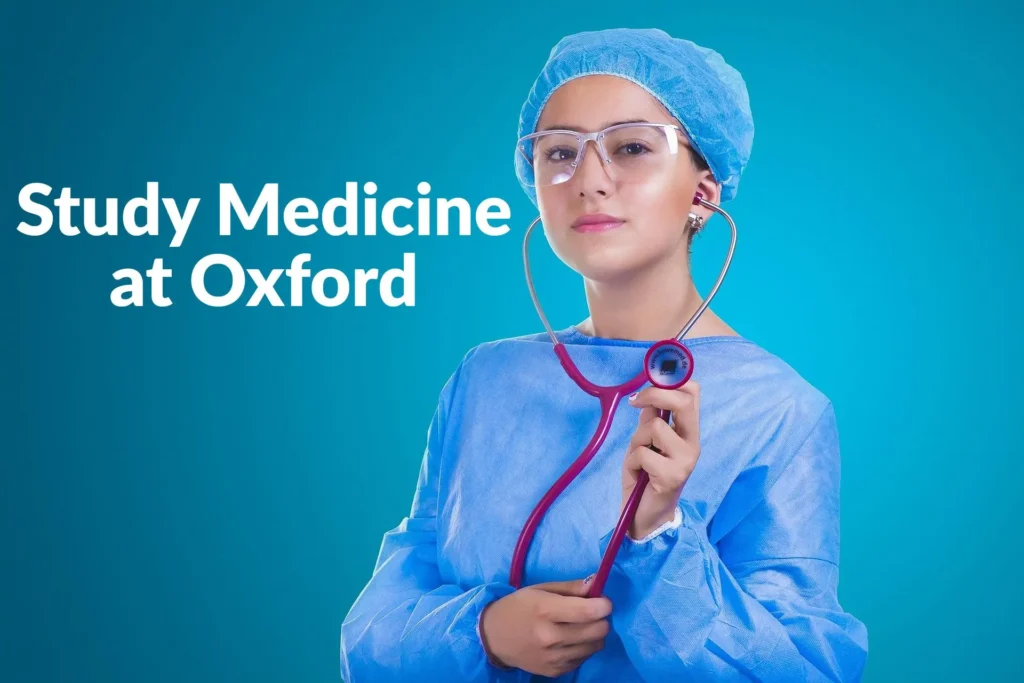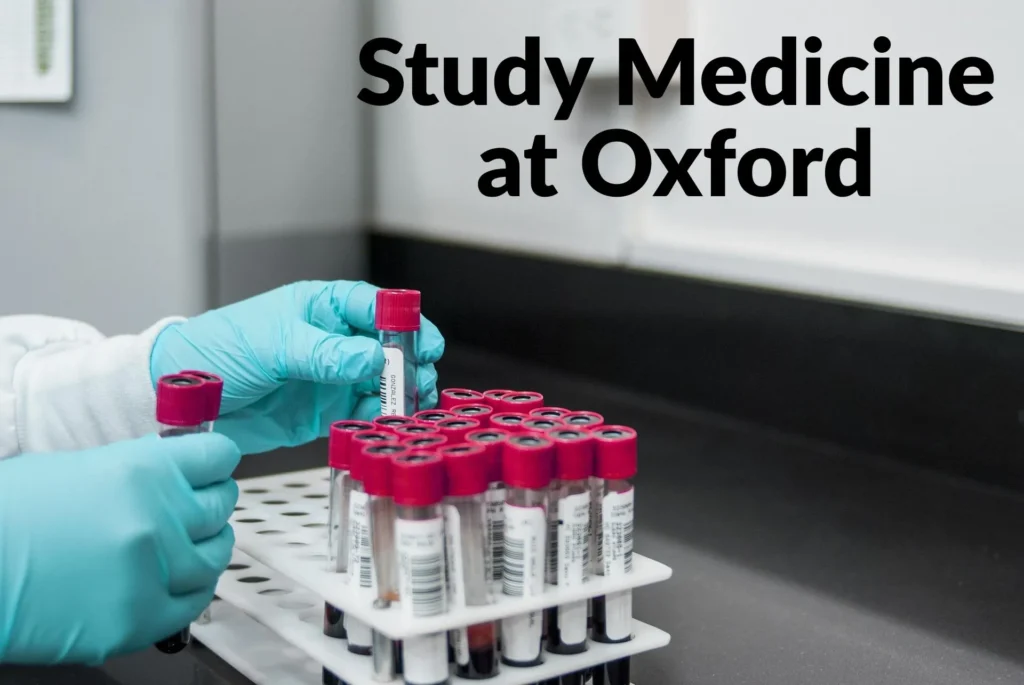Study Medicine at Oxford
For many aspiring doctors, the journey toward a career in medicine begins with one defining dream — earning a place at one of the world’s most prestigious universities. The University of Oxford Medicine course (A100) stands at the pinnacle of this ambition, offering an exceptional blend of academic excellence, research-driven learning, and real-world clinical exposure. This program isn’t just about earning a degree; it’s a transformative experience that cultivates scientific curiosity, critical thinking, and leadership in healthcare.
At Oxford Medical School, students embark on a six-year journey that integrates foundational medical sciences with clinical practice, supported by Oxford’s distinctive collegiate system. The Medicine BM BCh Oxford pathway is designed for highly motivated students who want to explore the science behind medicine, engage in independent research, and prepare for a meaningful, globally recognized medical career.
This guide provides everything you need to know about studying Medicine at Oxford University — from course structure and entry requirements to the application process, student experience, and future opportunities. Whether you’re a prospective applicant, an educator guiding future doctors, or a parent supporting an aspiring medic, this article will help you understand what it truly takes to succeed in the world of Oxford Medicine.
The Oxford Medicine Journey
The Oxford Medicine Course (UCAS code: A100) is one of the most respected and academically rigorous medical programs in the world. Structured around a clear distinction between pre-clinical and clinical training, it offers students a deep intellectual foundation in the core scientific principles that underpin modern medicine. Over six transformative years, the program begins with an intensive three-year pre-clinical stage, where students earn a BA Honours degree in Medical Sciences, followed by three years of clinical training focused on patient care and practical application. This distinctive structure, unique to Oxford Medical School, ensures that graduates emerge not only as highly competent doctors but also as scientifically grounded thinkers equipped to contribute to groundbreaking medical research and innovation.
Oxford University enrollment process explained

Years 1-3 BA in Medical Sciences
The initial three years of the Oxford Medicine Course are dedicated to the pre-clinical stage, where students delve deep into the scientific principles governing human health and disease. This phase is characterized by an intense focus on understanding the body at a fundamental level, preparing students for the complexities of clinical practice. The curriculum is structured to encourage an enquiring approach, fostering critical thinking and an appreciation for the experimental basis of medical science.
First BM (Terms 1-5)
The first five terms are devoted to the First BM, which covers a broad spectrum of scientific knowledge essential for medicine. Students are introduced to the major systems of the body, studying their structure and function in health, and exploring the principles of disease processes. This includes core subjects such as the Organisation of the Body, Physiology and Pharmacology, Biochemistry and Medical Genetics, and Population Health. Early exposure to clinical problems and regular visits to GP tutors ensure that the scientific learning is always contextualized within a clinical framework. Assessment during this period typically involves in-person examinations and other forms of evaluation, ensuring a comprehensive understanding of the foundational sciences.
Final Honours School (Terms 6-9)
Following the First BM, students embark on a four-term BA Honours course, known as the Final Honours School, in Medical Sciences. This stage allows for specialization in various areas of biomedical science, chosen from a range of advanced options. Students engage with primary research literature, developing advanced technical skills in laboratory work, scientific data handling, and presentation. This period is crucial for cultivating critical and creative thinking, enabling students to gain in-depth knowledge in their chosen fields, such as Systems Neuroscience, Cardiovascular Science, Pharmacology and Signalling, or Molecular Pathology and Cancer. The assessment includes in-person examinations, submitted work, and oral presentations of research projects, reflecting the research-intensive nature of this stage.
The Oxford Tutorial & Teaching Methods
A cornerstone of the Oxford educational experience, particularly for the Medicine course, is the unique tutorial system. During the First BM, lectures and practicals occupy approximately half of the student’s time, with the remainder dedicated to tutorial work, self-directed study, and extracurricular activities. In the BA course, formal lecturing is minimized, allowing students greater freedom to pursue their research and prepare for tutorials and seminars. Students typically meet with their tutors weekly in small groups, often as few as two, allowing for highly personalized teaching tailored to individual needs and interests. This intimate setting, led by world-leading experts and experienced NHS clinicians, fosters strong academic support and encourages effective time management. While classes and seminars might range from 10 to 50 students, and lectures can accommodate up to 200, the tutorial system ensures that every student receives focused, in-depth guidance, making the study Medicine at Oxford experience truly distinctive.
Clinical Immersion: Years 4-6 (BM BCh)
Why Choose Oxford for Your Medical Degree?
Choosing where to pursue a medical degree is one of the most significant decisions an aspiring doctor will make. For many, the University of Oxford stands out as an unparalleled choice offering a unique blend of academic excellence, a distinctive educational philosophy, and a rich collegiate experience. The Oxford Medicine Course is not merely about acquiring medical knowledge, it’s about fostering a profound understanding of the scientific underpinnings of health and disease, nurturing critical thinking, and developing future leaders in healthcare.

Oxford Medicine Entry Requirements
Admission to the Oxford Medicine Course (A100) is highly competitive, attracting over a thousand applicants each year for a limited number of places. The university seeks candidates who demonstrate exceptional academic ability, a genuine aptitude for medicine, and a realistic understanding of the demands of a medical career. Meeting the stringent entry requirements is the first crucial step in this challenging journey.
Academic Prerequisites
Admissions Tests: The UCAT
English Language Requirements
- IELTS (Academic): An overall score of 7.5, with a minimum of 7.0 in each component.
- TOEFL (iBT): An overall score of 110, with minimum component scores of 22 in Listening, 24 in Reading, 25 in Speaking, and 24 in Writing.
- Cambridge English Advanced/Proficiency: An overall score of 191 or above, with at least 185 in each component.
The Application Journey: A Step-by-Step Guide
Applying to the Oxford Medicine Course is a multi-faceted process that demands meticulous planning, sustained effort, and a deep understanding of what the university seeks in its future medical professionals. It is a journey that begins well before the UCAS deadline and involves several distinct stages, each designed to assess a candidate’s academic potential, aptitude for medicine, and personal qualities.
UCAS Application and Personal Statement
Preparing for the UCAT
Given the UCAT’s role in shortlisting, thorough preparation is paramount. Unlike traditional academic exams, the UCAT assesses innate abilities rather than learned knowledge, making conventional revision less effective. Instead, preparation should focus on practice questions and mock tests to build skills, improve speed, and familiarize oneself with the test format. Numerous resources offer UCAT question banks with worked solutions, which are invaluable for learning from mistakes and refining strategies across the Verbal Reasoning, Decision Making, Quantitative Reasoning, Abstract Reasoning, and Situational Judgement sections.
The Oxford Medicine Interview
College Selection
Oxford’s collegiate system means that applicants apply to a specific college, which plays a significant role in their university experience. With over 30 colleges, each possessing its own character and academic strengths, choosing the right one can be a daunting task. While all colleges admit medical students, some may have particular strengths or a higher intake of medical students. Researching individual colleges, attending open days, and understanding their unique offerings can help applicants make an informed decision that aligns with their preferences and academic aspirations. The college provides a supportive community, academic guidance, and often a substantial portion of the tutorial teaching, making it an integral part of the Oxford Medicine journey.
Fees and Financial Support
Understanding the financial implications of studying at Oxford is an essential part of the application process. The University of Oxford is committed to ensuring that financial circumstances do not deter academically able students from pursuing their studies. While the costs can be substantial, especially for overseas students, a range of support is available.
Annual Course Fees
Fee Status | Annual Course Fee (2025/26) |
Home | £9,535 |
Overseas | £49,400 |
Fee Status | Annual Course Fee (Guide for 2026) |
Home | £9,535 |
Overseas | £65,250 |
Financial Support
Oxford offers one of the most generous financial support packages available for UK undergraduate students, which may be supplemented by additional support from individual colleges. This support can come in the form of bursaries, scholarships, and grants, designed to help cover living costs and tuition fees. Prospective students are strongly encouraged to explore the university’s financial support pages and contact their chosen college for specific details on available funding opportunities. For international students, various scholarships and funding options are also available, often based on academic merit or specific regional criteria. The university’s commitment to financial accessibility ensures that talented students from all backgrounds have the opportunity to pursue an Oxford medical education.
Conclusion
The Oxford Medicine Course represents a pinnacle of medical education, offering an unparalleled blend of scientific depth, intellectual challenge, and personalized learning. It is a journey that demands dedication, resilience, and a genuine passion for medicine, but one that ultimately shapes graduates into highly competent, compassionate, and critically thinking medical professionals. From the rigorous pre-clinical scientific training to the immersive clinical experience, and supported by the unique tutorial system and collegiate life, Oxford provides an environment where future doctors can truly flourish.
